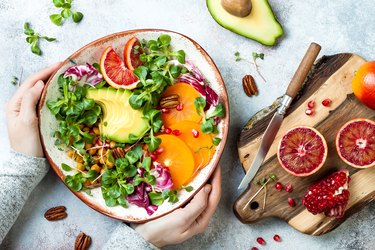
You wake up the morning after a night spent partying with a throbbing head, achy bod and nausea that makes you wish you could crawl out of your skin. Yup, you're hungover.
Your first thought (after I'll never drink that much again) is How can I quit feeling like crap — stat?
Video of the Day
Video of the Day
While there is no real cure for a hangover, there are natural remedies that can help take the edge off the most punishing symptoms and replenish your body.
Here's the lowdown on which hangover treatments soften the blow, and which are totally phony. You'll want to drink in this intel.
1. Drink Water
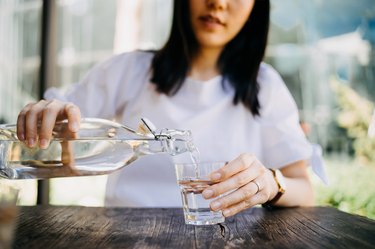
Booze is a diuretic, meaning it makes you pee more.
"Alcohol downshifts the hormones that signal your kidneys to conserve water," says Sunjya Schweig, MD, founder and president of the California Center for Functional Medicine. "It decreases your ability to hold onto water, so you will release fluid."
Being parched, in turn, brings on hallmark hangover symptoms like headache and fatigue.
Because rehydration after drinking is especially helpful for a headache or body aches, go gangbusters with the H2O.
How to Drink Water for a Hangover
Get ready to guzzle: "The rule of thumb is that you should drink half your body weight in [ounces of] water every day," Dr. Schweig says. "But if you've been consuming alcohol, you need to replace those lost fluids — especially if you have diarrhea or vomiting."
So aim to slurp down three-quarters of your body weight in ounces of water or electrolyte drinks (more on that in a sec). For example, if you weigh 200 pounds, drink 150 ounces throughout the day — that's a little more than a gallon total.
2. Replenish Electrolytes
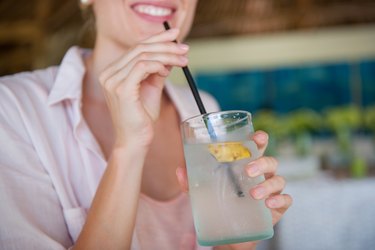
Dehydration from drinking can lead to an imbalance of electrolytes.
"Electrolytes contain critical minerals for cell function, including sodium, calcium, potassium and magnesium," says Dr. Schweig. "Low levels of electrolytes can make you lethargic, lead to an irregular heartbeat, and cause nausea, vomiting and diarrhea."
Enter electrolyte beverages.
"Having an electrolyte drink that contains a little salt and sugar allows you to absorb more fluid into your bloodstream than plain water," Dr. Schweig says. "Staying hydrated and replacing electrolytes are the fastest ways to feel better if you are hungover."
How to Use Electrolytes for a Hangover
First, opt for a natural source of electrolytes rather than a sports drink. "Low blood sugar is one of the core causes of a hangover," Dr. Schweig says. "Sports drinks typically contain preservatives, added sugar and carbohydrates, which could exacerbate a blood sugar imbalance."
He recommends 100 percent coconut water or LMNT Recharge ($20 for a 12-pack, Amazon.com), a powdered electrolyte drink mix. You can also DIY by whipping up an oral rehydration solution. The University of Virginia Health System offers up the following recipe: Dissolve 3/4 teaspoon of table salt and 2 tablespoons of sugar in one quart of water.
"Staying hydrated and replacing electrolytes are the fastest ways to feel better if you are hungover."
3. Add Ginger
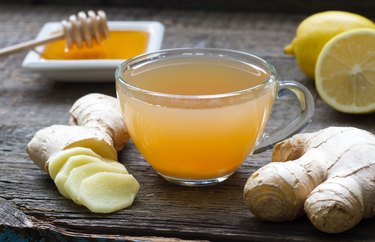
This spicy medicinal root can soothe an upset stomach.
"Alcohol damages the gut and increases intestinal permeability [aka "leaky gut"], leading to inflammation, more toxins in the bloodstream and immune system dysregulation," Dr. Schweig says. "Ginger contains a compound called 6-shogoal, which has been shown in preclinical research to prevent intestinal barrier breakdown and reduce inflammation."
And because booze does a number on your liver, here's a bonus: "Ginger is protective to the liver," Dr. Schweig says.
How to Use Ginger for a Hangover
Peel a knob of ginger and slice it into thin medallions. Then, pop a piece right into your mouth and suck on it.
If the flavor is too intense, sip a cup of ginger tea instead, such as Traditional Medicinals Organic Ginger Tea ($4.78, Walmart.com). Or brew an easy homemade version: Steep three to five ginger medallions in a cup of hot water for several minutes. If you like, add a teaspoon of raw honey and a pinch of salt.
"If you have a juicer, you can also make ginger juice," Dr. Schweig says.
Have ginger two or three times a day (or more as needed) for hangover-induced nausea.
What About Ginger Ale?
Skip the Seagram’s. “Commercial ginger ale contains very little actual ginger and a lot of sugar and high-fructose corn syrup, which is not healthy,” Dr. Schweig says.
4. Get Some Potassium
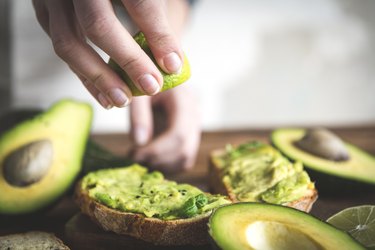
According to the U.S. National Library of Medicine, potassium helps regulate your heartbeat, deliver nutrients to your cells and clear away waste products — all super important if you've been drinking.
And because this key electrolyte becomes depleted when you get tipsy, you should replenish your stores the next day.
How to Use Potassium for a Hangover
Bananas are probably the first thing that comes to mind when you think of potassium, but consider your symptoms before you reach for one. "Bananas can cause constipation, which isn't great if you are hungover," Dr. Schweig says. You're more likely to have trouble pooping when you're dehydrated.
He suggests reaching for an avocado instead. They're chockfull of potassium and are also a great source of magnesium, another electrolyte. They won't stop you up, and because they're bland and alkaline, they shouldn't upset your stomach.
5. Take a Warm Shower or Bath

Not only is the warm water relaxing, but it can increase your circulation and help clear away toxins.
"Heat opens up your blood vessels, allowing blood to pump more easily through your system," Dr. Schweig says. "As a result, your blood passes more frequently through the liver, which filters waste products such as acetaldehyde from alcohol." More blood flow through the liver means less waste hanging around in your body.
What's more, the water temperature can help combat the negative effect that alcohol has on your energy levels. Depending on the temp, it can wake you up when you're groggy or help you score a super-restorative sleep at bedtime.
How to Use a Shower or Bath for a Hangover
Take a warm shower or bath once a day when you're hungover. Exhausted and need a pick-me-up? Blast cool agua for a minute or two at the end. "Cold water raises levels of cortisol, which has a stimulating effect," Dr. Schweig says.
On the other hand, if you're craving a deep night's sleep, hop into water that's between 104 and 108.5 degrees Fahrenheit one to two hours before hitting the hay. Per the National Sleep Foundation, this helps you drift off faster and improves the quality of your shut-eye.
6. Sip Chamomile Tea
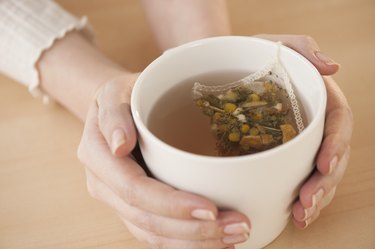
"Hanxiety" is when you feel intense worry, doubt and stress after drinking heavily. It might happen because you can't exactly remember what happened the night before, or because you did or said something you regret.
It's also biological: "When your body is dysregulated due to excessive alcohol intake, inflammatory pathways flare up and put you in fight-or-flight mode, which presents as feeling anxious or wound up," Dr. Schweig says. "In addition, alcohol is a central nervous system depressant; it can make you feel down and out."
Plus, booze throws your mood-regulating neurotransmitters out of whack, which can also trigger anxiety.
Here's where chamomile comes in: This healing plant has been used for thousands of years as an anti-inflammatory, antioxidant and mild sedative. A December 2016 study in Phytomedicine found that both short-term and long-term use of chamomile extracts eased symptoms of anxiety. And a January 2018 study in the Journal of Psychiatric Research discovered that when people with anxiety disorders took chamomile extract, it balanced out their levels of the stress hormone cortisol.
By the way, chamomile might help with hangover symptoms other than hanxiety. A June 2017 study in the Journal of Education and Health Promotion suggests that it improves sleep. It also reduced nausea in chemotherapy patients, a 2017 study in the Avicenna Journal of Nursing and Midwifery Care revealed.
How to Use Chamomile Tea for a Hangover
Drink one to two cups a day when recuperating from a big night out. Try Traditional Medicinals Organic Chamomile Tea ($8.44, Walmart.com).
7. Try Vitamin C
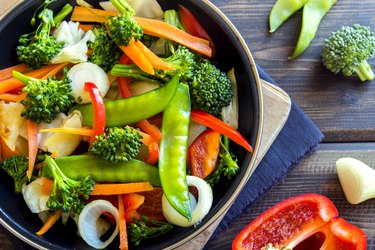
You probably think about popping C when you feel a cold coming on, but it can also give you a lift when you're dragging post-bender.
"Drinking alcohol causes oxidative stress, which leads to inflammation," Dr. Schweig says. "Vitamin C is a powerful antioxidant that fights free radicals, reducing inflammatory markers."
How to Use Vitamin C for a Hangover
Load up on foods rich in C, like oranges, kiwis, strawberries, broccoli and bell peppers.
"Getting vitamins from a food source is preferable," Dr. Schweig says. "But if you are too nauseous to eat, take a supplement of 1,000 milligrams of vitamin C once or twice a day." He recommends Pure Encapsulations Ascorbic Acid Capsules ($18.30, Walmart.com).
8. Slurp Some Bone Broth
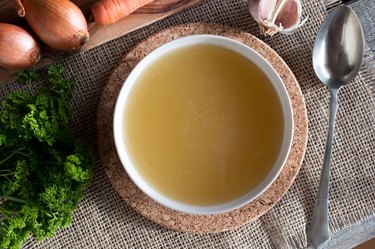
Wondering what's the best thing to eat if your hangover triggered an upset stomach? "I suggest bone broth for nausea," Dr. Schweig says. "It lessens gut inflammation and permeability."
How to Use Bone Broth for a Hangover
Sip a warm mug of broth one to two times a day.
"When you are nauseous from a hangover, stick to a clean, simple, nutrient-dense diet without added sugar or unhealthy fats," Dr. Schweig says. "Heavy, processed foods make your liver work harder, and you want to give your liver a break." I
f you're among the nearly 50 percent of people who dig into greasy foods when hungover, according to a 2018 American Addiction Centers survey, we're talking to you!
9. Consider Acupressure

This traditional Chinese pain-reduction treatment works by activating specific points located on the body's meridians, or energy channels. "It can help ease a headache and nausea from a hangover," Dr. Schweig says.
How to Use Acupressure for a Hangover
If your head is pounding, locate the pressure point known as L-14, or Hegu. "This spot is between the base of your thumb and pointer finger," Dr. Schweig says. "Mash on it using deep, firm pressure for one to three minutes as needed."
For nausea, target the point called P-6, or Neiguan. "P-6 is three finger widths below the crease of your inner wrist," Dr. Schweig says. "Push on it with your fingertips for several minutes."
10. Get Some Sleep
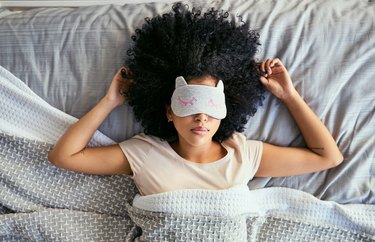
Booze is kryptonite to a good night's rest. "It disrupts sleep, impairing REM sleep in particular," Dr. Schweig says. It also leads to more frequent nighttime awakenings while intensifying snoring and sleep apnea.
"A lack of sleep can worsen all the symptoms of a hangover, so it's imperative to get your circadian rhythm back in balance," Dr. Schweig says. "Sleep is also the best way to lessen body aches from a hangover."
How to Use Sleep for a Hangover
The day after drinking, it's more important than ever to practice good sleep hygiene. According to the National Sleep Foundation, that means unplugging your electronics an hour before bed; avoiding caffeine, rich meals and — of course — alcohol late in the day; getting fresh air, sunlight and exercise; and keeping your bedroom comfortable, cool, dark and quiet.
What about naps? "Although you can take a nap if you're exhausted, don't sleep for too long or too late in the day," Dr. Schweig says. Otherwise, you might find it hard to nod off at night.
Alcohol can throw your sleep schedule into chaos, so you might have trouble getting to dreamland regardless. "In that case, try deep breathing or turn on a sleep meditation," Dr. Schweig says. Many people swear by the 4-7-8 breathing method and diaphragmatic breathing. Or give one of these relaxation apps a shot.
What About Beer?
Do you rely on the "hair of the dog" method to cure a hangover? You're barking up the wrong tree.
"If you are a habitual heavy drinker, you might go into a mini withdrawal the next day, so drinking more could ease those symptoms," Dr. Schweig says. "But if that's the case, you should seek professional help for alcohol addiction."
He points out that alcohol also has an analgesic effect. "It might blunt some of the acute sensations associated with a hangover, but ultimately it will prolong your symptoms," Dr. Schweig says. "I don't recommend it."
What About Throwing Up?
Puking is a natural response to alcohol poisoning. According to the Alcohol Pharmacology Education Partnership at Duke University, nerve endings in your stomach send a signal to your brain that there is something toxic in your system. Your brain also gauges the amount of booze in your bloodstream and if it's too high, it might respond by directing your body to vomit. "If you are still intoxicated, vomiting might help get rid of some of the alcohol in your stomach," Dr. Schweig says.
But once you wake up feeling wretched in the morning, forcing yourself to hurl is a no-go. "At this point, vomiting will only exacerbate your dehydration and make you feel worse," Dr. Schweig says. "In addition, vomiting irritates and inflames your stomach, causing gastric acid and pancreatic acid to build up and slowing down stomach emptying."
Essentially, it makes it harder for your body to process alcohol and move it through your system.
Related Reading
How Long Will a Hangover Last?
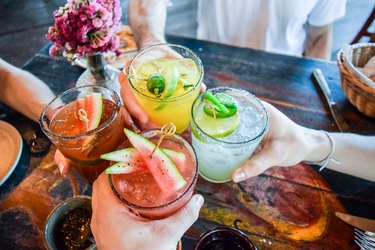
You're probably looking at 24 hours of misery, but it could persist up to three days. "How much and how quickly you drank impacts your ability to metabolize alcohol," Dr. Schweig says.
He points out that some people lack an enzyme called alcohol dehydrogenase, which helps break down the toxic compound ethanol in alcohol. It is common in folks of East Asian descent, and makes you more susceptible to both intoxication and hangovers.
Your fluid status also plays a role. "If you were dehydrated prior to drinking and didn't drink much water while drinking, you are more likely to have hangover effects," Dr. Schweig says. "Dehydration is the number one mechanism that contributes to hangover symptoms, including dizziness, headache, lightheadedness and dry mouth."
Nutrition might make a difference, too. "In a small study, people with higher zinc and B vitamin levels reported being less hungover," Dr. Schweig says.
Finally, consider what you drink. "Dark alcohol, like whiskey, rum, brandy, dark beer and red wine might cause a longer hangover than clear drinks, due to a chemical called congeners," Dr. Schweig says.
On that note…
Can Sticking to Vodka Prevent a Hangover?
Rumor has it that as long as you opt for screwdrivers and Moscow mules, you'll feel A-OK after hitting the sauce. True?
Don't drink the Kool-Aid. "You will still get dehydrated, no matter what type of alcohol you ingest," Dr. Schweig says.
That said, vodka does contain fewer congeners. "Congeners are a type of chemical formed during the alcohol fermentation process," Dr. Schweig says. "They occur when sugars are converted into alcohol through different strains of yeast, and they give flavor to the beverage."
They also trigger more severe hangovers. "Congeners stimulate the body to release stress hormones, which can lead to inflammation and fatigue," Dr. Schweig says.
The amount of congeners you end up consuming depends on what you drink. "Congeners occur more frequently in dark alcohol," Dr. Schweig says. "It is also probably the case that the more distilled a spirit is, the fewer congeners it has; thus 'top-shelf liquors,' which are more distilled, might have less of a hangover effect."
Finally, it might be worth paying more for an organic pour. "There may be other toxins and chemicals used in the growing and distillation process that can have a negative morning-after effect," Dr. Schweig says.
But the safest bet of all? Join the "Sober October" movement, and go booze-free to begin with!
- University of Virginia Health System: "Homemade Oral Rehydration Solutions"
- USDA: "COCONUT WATER"
- U.S. National Library of Medicine: "Potassium"
- Sleep Foundation: "Showering Before Bed"
- Phytomedicine : "Long-term chamomile (Matricaria chamomilla L.) treatment for generalized anxiety disorder: A randomized clinical trial "
- Journal of Psychiatric Research : "An exploratory study of salivary cortisol changes during chamomile extract therapy of moderate to severe generalized anxiety disorder "
- Journal of Education and Health Promotion : "Investigation effect of oral chamomilla on sleep quality in elderly people in Isfahan: A randomized control trial"
- Avicenna Journal of Nursing and Midwifery Care: " 10.30699/sjhnmf.25.4.140 XML Persian Abstract Print Download citation: BibTeX | RIS | EndNote | Medlars | ProCite | Reference Manager | RefWorks Send citation to: Mendeley Zotero RefWorks borhan F, naji A, Molavi Vardanjnai M, Sasani L. Effects of Matricaria Chamomilla on the Severity of Nausea and Vomiting Due to Chemotherapy. Avicenna J Nurs Midwifery Care. 2017; 25 (4) :140-146 URL: http://nmj.umsha.ac.ir/article-1-1690-en.html Effects of Matricaria Chamomilla on the Severity of Nausea and Vomiting Due to Chemotherapy "
- NSF: "Sleep Hygiene"
- Alcohol Pharmacology Education Partnership at Duke University: "Alcohol-induced Vomiting can be Fatal"
- American Addiction Centers: "Hating Hangovers"
Is this an emergency? If you are experiencing serious medical symptoms, please see the National Library of Medicine’s list of signs you need emergency medical attention or call 911.